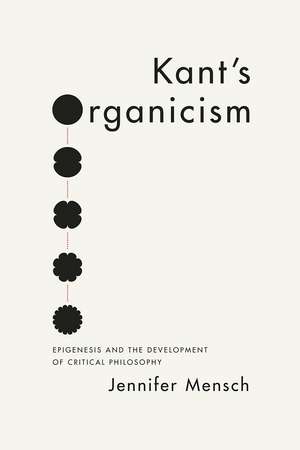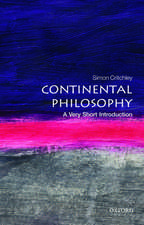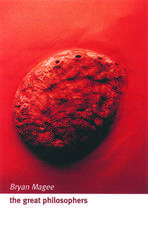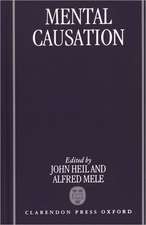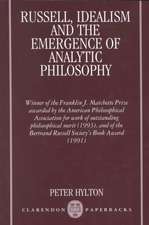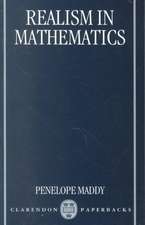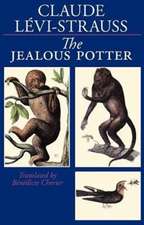Kant's Organicism: Epigenesis and the Development of Critical Philosophy
Autor Jennifer Menschen Limba Engleză Paperback – 7 mai 2015
Because it laid the foundation for nearly all subsequent epistemologies, Immanuel Kant’s Critique of Pure Reason has overshadowed his other interests in natural history and the life sciences, which scholars have long considered as separate from his rigorous theoretical philosophy—until now. In Kant’s Organicism, Jennifer Mensch draws a crucial link between these spheres by showing how the concept of epigenesis—a radical theory of biological formation—lies at the heart of Kant’s conception of reason.
As Mensch argues, epigenesis was not simply a metaphor for Kant but centrally guided his critical philosophy, especially the relationship between reason and the categories of the understanding. Offsetting a study of Kant’s highly technical theory of cognition with a mixture of intellectual history and biography, she situates the epigenesis of reason within broader investigations into theories of generation, genealogy, and classification, and against later writers and thinkers such as Goethe and Darwin. Distilling vast amounts of research on the scientific literature of the time into a concise and readable book, Mensch offers one of the most refreshing looks not only at Kant’s famous first Critique but at the history of philosophy and the life sciences as well.
Preț: 228.41 lei
Nou
Puncte Express: 343
Preț estimativ în valută:
43.71€ • 45.75$ • 36.38£
43.71€ • 45.75$ • 36.38£
Carte tipărită la comandă
Livrare economică 31 martie-14 aprilie
Preluare comenzi: 021 569.72.76
Specificații
ISBN-13: 9780226271514
ISBN-10: 022627151X
Pagini: 258
Ilustrații: 1 halftone
Dimensiuni: 152 x 229 x 18 mm
Greutate: 0.34 kg
Editura: University of Chicago Press
Colecția University of Chicago Press
ISBN-10: 022627151X
Pagini: 258
Ilustrații: 1 halftone
Dimensiuni: 152 x 229 x 18 mm
Greutate: 0.34 kg
Editura: University of Chicago Press
Colecția University of Chicago Press
Notă biografică
Jennifer Mensch teaches philosophy and the history of science and medicine at the University of Western Sydney.
Cuprins
Preface
Introduction: Kant’s Organicism
1 Generation and the Task of Classification
Mechanism and the Principle of Life
Leibniz’s Organic Machines
2 Buffon’s Natural History and the Founding of Organicism
Hales and the Physiology of Plants
Buffon the French Newtonian
Maupertuis, Buffon, and the Problem of Form
Natural History and the History of Nature
3 Kant and the Problem of Origin
Kant’s Eclecticism
Matter and Cosmos
The Spectacle of Life
4 The Rebirth of Metaphysics
A Philosophy is Born
From Original Acquisition to the Epigenesis of Knowledge
Concepts and Objects: Kant’s Letter to Herz, 1772
5 From the Unity of Reason to the Unity of Race
The Unity of Reason
The Unity of Race
A Germ of Reason and a Germ for Race
6 Empirical Psychology in Tetens and Kant
Epigenesis and Evolution in Tetens’sPhilosophical Essays
From Empirical Psychology to a Transcendental Theory of Imagination
Transcendental Philosophy and the Physiology of Pure Reason
7 Kant’s Architectonic: System and Organism in the Critique of Pure Reason
The Doctrine of Method: The Bauplan of the System
The Transcendental Deduction: The Bauplan at Work
Organic Logic: A Cautionary Tale
Epilogue: A Daring Adventure of Reason
Notes
Bibliography
Index
Recenzii
“A striking and radical rereading of the first Critique through the concept of ‘epigenesis.’ . . . Mensch’s reading is bold and innovative; it deserves to be debated at length by Kant scholars.”
“Mensch’s attempt to interpret Kant’s transcendental philosophy in relation to eighteenth-century life sciences is original and exciting. … Mensch convincingly shows that questions concerning the origin of cognitions strongly informed Kant’s philosophy. This result is important, since many philosophers, often operating in the wake of Peter F. Strawson’s analytic Kant interpretation, have ignored these types of questions when studying Kant. In short: Mensch’s book is a good example of the fruitful integration of Kant studies with history of science.”
“Jennifer Mensch’s account of how Kant came to understand the thinking of the naturalists over the course of the eighteenth century and relate it to his own quest for a transcendental ground of reason in self-generation is very well wrought. She has made sense of a number of elements that I knew separately but had not seen in this compelling conspectus.”
“In recent years a host of editions, translations, monographs, and articles have introduced Anglo-American readers to a Kant different from the anti-metaphysical epistemologist and rigorous ethicist of earlier scholarship. Kant has emerged as a pragmatic anthropologist, a physical geographer, and a natural historian. Jennifer Mensch’s book seeks to unify the two pictures of Kant by tracking the formative background of the Critique of Pure Reason in Kant’s own original account of the biological development of individuals and species. Her provocative epigenesist reading challenges the distinction between matters of fact (quid facti) and grounds of validity (quid iuris) in Kant’s account of a priori knowledge.”
“In this concise and tightly argued monograph, Mensch has demonstrated . . . Kant’s continual and critical attentiveness to the work of the emergent life sciences across the eighteenth century. She shows a clear grasp of what that scientific work took up and what its philosophical implications were—both for the scientists and for Kant. . . . Her account of how Kant came to understand the thinking of the naturalists over the course of the eighteenth century and relate it to his own quest for a transcendental ground of reason in self-generation is very well wrought.”
“Kant’s Organicism is an excellent and fascinating philosophical-historical study, well worth reading for any Kant scholar. It also provides a rich source of stimulating ideas for contemporary Kantian philosophers.”
